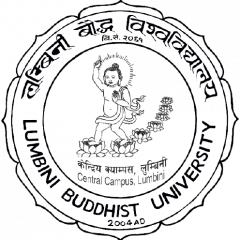MA in Museology and Buddhist Collections
About This Course
Museology is a systematic study of the acquisition, display, management, storage, conservation, and preservation of the artifacts recovered from the archaeological sites as well as other sources for the future generation. A wide range of architectural remains and artifacts recovered from different Buddhist archaeological sites across the region have served as the material evidence in attesting the historicity of Sakyamuni Buddha and his teachings. These sites along with artifacts are well preserved on-site and in museums throughout the region and beyond. LBU has been running MA in Museology and Buddhist Collections program since 2016 in Kathmandu.
Course Objectives
The main objectives of the courses are to impart students with theoretical knowledge and practical skills in Museology and Buddhist Collections including museum management, collections, documentation, conservation, preservation, exhibition, research, the role of the museum in society, education and recreation. On completion of the course, students will be qualified to:
1. Undertake research and pursue Ph. D degree
2. Work in public and private service at the officer level as Museologists, Curators,
Managers, Art historians and Museum Educators.
3. Work as consultants, advisors or researchers in Buddhist galleries or monasteries.
4. Serve as teachers in Universities and other institutes.
Credit Weight age,
The total credit hour of two years/four-semester cycle course is 60 credit hours. The course comprises of 17 papers weighing 3 credit hours each, 3 credit hours of internship and 6 credit hours of dissertation.
Teaching Methods
The courses are designed with three strategic motives, ie. i) imparting theoretical knowledge on the subject matters, ii) equip students with technical skills and iii) sensitizing on the sense of responsibility toward safeguarding cultural heritage through holistic approach of teaching/learning methods that includes lecture, seminar, group discussion, fieldwork, intern (hand-on-practice), project work (thesis), etc. Due consideration will be paid to make the teaching-learning more interactive and participatory.
Internship:
The students are mandatory to spend about 144 hours in a museum of their choice as an internship. The main purpose of the internship is to provide them first-hand experience of practical aspects of museology and enable them to explore the areas of putting theory into practice in real-life situations. Throughout the internship period, their work will be supervised by a designated person of the respective museum who will, at the end undertake an evaluation based on the scheme developed by LBU. At the end of the internship, the students will submit an internship report and subsequently make a presentation at the college. The evaluation of the
the internship will be based on the combination of site-evaluation by mentor and the report followed by presentation made at the college.
Attendance:
Students are expected to maintain 70% attendance otherwise they are considered disqualified to appear in the end-semester examination. However, in an exceptional circumstance such as serious illness, accident, situation beyond the control, the students with a minimum of 60% attendance may be allowed to appear in the end-semester examinations upon the submission of an authorized medical certificate or a certified letter by relevant authorities in other cases.
Evaluation of the performance of the students
Evaluation of the student’s progress is undertaken in two modes, one being internal evaluation (in-semester) and the other being end-semester examination. Out of full marks, 40% marks are allocated for an internal exam and 60% marks are allocated for the end-semester exam. Students having failed in securing minimum required marks in the internal evaluation are considered as disqualified to appear in end-semester examinations.
The mode of internal evaluation may be of one or a combination of the following.
1) Class assignment
2) Home assignment
3) Presentation
4) Writing a term paper
5) Report writing
6) Project work
End- Semester examination
The end-semester examination will be conducted twice a year in six months intervals. The weight of the end-semester examination would be 60% of full marks. The students have to secure a minimum of 50% of full marks in each subject to pass the end-semester examination.
Grading system
Please refer to LBU Semester System Rules and Regulation for Semester Grade Point Average (SGPA) and Cumulative Grade Point Average (CGPA).
Eligibility
Students seeking admission to the degree of Master’s degree in Museology and Buddhist Collections must have passed Bachelor’s degree in any subject from any university recognized by LBU.


